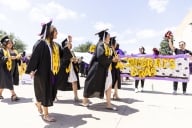You have /5 articles left.
Sign up for a free account or log in.
The rejected applicant who asked the U.S. Education Department to investigate his treatment by Harvard and Princeton Universities has withdrawn his complaints against the two institutions. As a result, the department's Office for Civil Rights has notified the universities that the complaint is no longer under investigation. A broader review of Princeton's treatment of Asians in the admissions process -- already going on for several years -- continues.
According to the department, the complaint against Harvard and Princeton was filed in August. The name of the rejected applicant has not been released, so he could not be reached to find out why he changed his mind about the inquiry. All that is known about him is that his family is from India.
Harvard released a statement Friday about the end of the inquiry: "We are pleased that the complaint against Harvard has been withdrawn and that OCR has closed the case. Harvard College welcomes talented students from all backgrounds, including Asian Americans. Our review of every applicant's file is highly individualized and holistic, as we give serious consideration to all of the information we receive and all of the ways in which the candidate might contribute to our vibrant educational environment and community."
Word of the inquiry into the applicant's rejection revived longstanding discussions of allegations that Asian Americans need better academic records than other students do to be admitted to top colleges. A broad compliance review of Princeton has been known since 2008, but the slow going on that probe has left many advocates for Asian-American applicants wondering when their complaints would be taken seriously. In cases where OCR makes a full determination on a complaint, those rulings can be used to gain a sense of how the agency is interpreting various legal issues. But since these cases were dropped, there is no legal analysis being produced about them.
While Asian Americans are well-represented in the student bodies of elite colleges and universities, many argue that their high grades and test scores, on average, should result in even more of them being admitted. Others note that groups favored in admissions for non-academic reasons (for example, athletes or offspring of wealthy alumni) or for diversity reasons (generally black and Latino students, or those from sparsely populated states or regions) tend not to be Asian American. The reason advocates for Asian Americans have been so interested in the OCR inquiries is that they might indicate whether colleges just use such (legal) preferences or have crossed over (which the colleges deny) into de facto quotas that limit Asian enrollments.
As an article in Slate put it, after the Harvard and Princeton complaints became public, "we know perfectly well that this discrimination happens. The only real issue is whether or not they're breaking the law."








